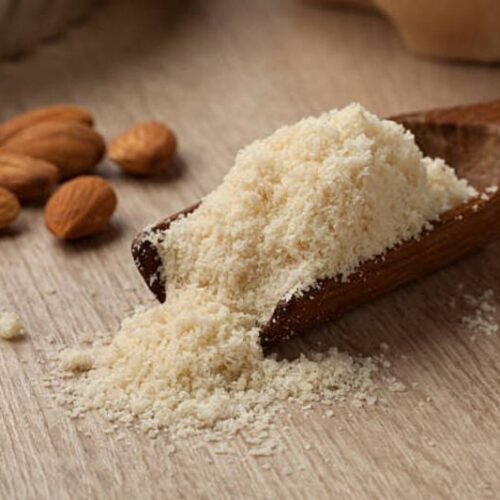If you’ve been stocking up on almond flour lately, you may be wondering if it has an expiration date. Does almond flour go bad? Yes, it can. Almond flour can last for up to six months in a pantry or up to one year in the freezer.
However, it’s important to note that the quality of the almond flour may decrease over time, so it’s best to use it within those timeframes. Let’s take a look at the science behind this popular gluten-free baking ingredient.
Does almond flour go bad?
Yes, almond flour can actually go bad after some time. It is a popular alternative to traditional wheat flour, but many people are unsure about how long it will last.
Although almond flour does not contain gluten, it can still go bad if it is not stored properly. If stored in a cool, dry place, almond flour will last for up to six months.
However, if it is exposed to moisture or humidity, the flour will start to spoil more quickly. Signs that almond flour has gone bad include a change in color or texture and the presence of mold.
If you suspect that your almond flour has gone bad, it is best to discard it to avoid any food poisoning.
How Long Does Almond Flour Last?

When stored properly, almond flour can last for up to six months. However, there are a few things to keep in mind to ensure that your flour stays fresh.
- First, always store almond flour in an airtight container. This will help to keep out moisture and pests.
- Additionally, be sure to keep the flour in a cool, dry place.
- And finally, if you notice any off-smelling or moldy flour, it’s best to discard it.
By following these simple tips, you can enjoy the health benefits of almond flour for months to come.
How Long Does Almond Flour Last in the fridge?
If you’re looking to stock your pantry with almond flour, you might be wondering how long it will last. The answer depends on a few factors, such as how the flour is stored and whether it’s been opened or not.
Generally speaking, unopened almond flour will last for up to two years when stored in a cool, dry place.
Once the flour has been opened, it should be used within six months to ensure optimum freshness. If you store the flour in the fridge, it will have a shorter shelf life of about three months. And if you keep the flour in the freezer, it can last for up to a year. With proper storage, almond flour can be a long-lasting staple in your kitchen.
What About Homemade Almond Flour?
Almond flour is a type of gluten-free flour that can be used in a variety of recipes. It’s made from finely ground almonds, and it has a slightly sweet flavor and a dense texture.
Almond flour can be used in place of all-purpose flour in many baking recipes, and it’s also a popular choice for breading chicken or fish.
One downside of almond flour is that it’s pricier than other types of gluten-free flour. Additionally, almonds are a common allergen, so almond flour is not suitable for people with nut allergies.
Overall, almond flour is a delicious and versatile ingredient, but it’s important to keep its limitations in mind when baking.
6 Tips to Tell If Almond Flour Has Gone Bad

Almond flour is a versatile ingredient that can be used in a variety of sweet and savory recipes. However, like all food items, it can go bad over time. Here are six hints to tell if almond flour has gone bad:
1. The color of the flour has changed. Almond flour should be a light ivory color. If it has turned brown or gray, it is likely past its prime.
2. The texture of the flour has changed. Fresh almond flour should be fine and powdery. If it is clumpy or gritty, it has probably lost its moisture content and is no longer fresh.
3. There is mold growing on the flour. Even small amounts of mold can cause severe illness, so if you see any growth on your almond flour, discard it immediately.
4. The flour smells sour or unpleasant. If the almond flour doesn’t smell like almonds anymore, it is probably spoiled.
5. The flour has been stored for more than a year. Even if the flour looks and smells fine, it is probably no longer fresh after 12 months.
6. The packaging is damaged or swollen. If the almond flour is not stored properly, it may have been exposed to moisture or pests, which can lead to spoilage. If you notice any of these signs, it is best to discard the almond flour and buy a fresh product.
We hope now you must know the answer to the question does almond flour go bad because we have explained everything about its spoilage in detail.
How to Store Almond Flour?

Here are a few tips about storing almond flour to keep it fresh
- Almond flour can be stored in the pantry, fridge, or freezer. The best way to store it is in an airtight container in the fridge or freezer.
- To extend the shelf life of almond flour, you can store it in the freezer. Just make sure to thaw it out before using it.
- If you want to use almond flour right away, then storing it in the pantry is fine. Just make sure to use it within a few weeks.
These are a few tips on how to store almond flour. By following these tips, you can keep your almond flour fresh and delicious for months. If you want to know the answer to the question, does almond flour go bad, then read this blog post from start.
Storing Almond Flour in the Pantry
Unlike wheat flour, almond flour does not contain gluten, which makes it an ideal choice for people with gluten sensitivities. Additionally, almond flour is higher in protein and healthy fats than wheat flour.
For these reasons, many people choose to use almond flour in place of wheat flour when baking. When stored properly, almond flour can last for up to six months in the pantry. To extend its shelf life, store almond flour in an airtight container in a cool, dry place.
If you live in a warm climate, consider storing the flour in the refrigerator or freezer to prevent it from going rancid. With proper storage, you can enjoy the benefits of almond flour for months to come.
Storing Almond Flour in the Refrigerator
The best way to store almond flour is in an airtight container in the refrigerator. This will keep the flour fresh for up to six months.
When you’re ready to use the flour, simply remove it from the fridge and let it come to room temperature before using.
Almond flour can be used in a wide variety of recipes, so don’t be afraid to get creative with it. With a little effort, you can easily make delicious and healthy meals that the whole family will enjoy.
Can You Freeze Almond Flour?
Yes, you can freeze almond flour. This is a great way to keep it fresh for longer and prevent it from going bad. When freezing almond flour, be sure to place it in an airtight container or sealable bag.
This will help to protect it from moisture and freezer burn. Additionally, you may want to write the date on the container so you know how long it has been stored.
Assuming it is properly stored, frozen almond flour will typically stay fresh for up to six months. However, for the best quality, it is best used within the first three months. When you are ready to use frozen almond flour, simply thaw it overnight in the refrigerator. Once thawed, give it a quick stir before using it in your recipe.
What If You Consume The Spoiled Almond Flour?
If you consume spoiled almond flour, you may experience food poisoning. Symptoms of food poisoning include nausea, vomiting, and diarrhea. You may also experience a fever, chills, and abdominal pain.
If you experience any of these symptoms after consuming spoiled almond flour, you should seek medical attention immediately. Food poisoning can be very serious and even life-threatening. Therefore, it is important to always use fresh almond flour and to check the expiration date before consuming it.

Does Almond Flour go bad?
Instructions
Does almond flour go bad?
- Although almond flour does not contain gluten, it can still go bad if it is not stored properly. If stored in a cool, dry place, almond flour will last for up to six months.
How Long Does Almond Flour Last?
- When stored properly, almond flour can last for up to six months. However, there are a few things to keep in mind to ensure that your flour stays fresh.
FAQ
One of the biggest advantages of almond flour is that it’s gluten-free, making it a good choice for people with celiac disease or gluten intolerance. Additionally, almond flour is high in nutrients like vitamin E and magnesium.
However, almond flour can be expensive and doesn’t always work well as a 1:1 replacement for wheat flour in recipes. Additionally, almond flour can go rancid more quickly than wheat flour, so it’s important to store it in a airtight container in the fridge or freezer.
Now, you know the answer to the question, does almond flour go bad. Let’s take a look at a couple of the most frequently asked questions about Almond flour and its storage.
Does almond flour need to be refrigerated?
Yes, almond flour is a high-fat food and should be stored in the refrigerator. The fats in almond flour can become rancid if left at room temperature for an extended period of time. Rancid fats not only taste unpleasant, but they also can be harmful to your health.
Can I use almond flour past its expiration date?
Yes, you can use almond flour past its expiration date. Almond flour is a type of nut flour made from finely ground almonds. It is often used to replace wheat flour in recipes. The expiration date on almond flour is mostly a guide for freshness. As long as the almond flour is not damaged (e.g., wet, moldy, etc.), it can be safely used after the expiration date has passed.
Is Almond Meal And Almond Flour The Same Thing?
There are a few main differences between almond meal and almond flour. Almond meal is made of whole, chopped almonds that still have their skin on. Almond flour, on the other hand, is made of blanched almonds (almonds with their skin removed). This means that almond flour is a finer powder and has a lighter color than almond meal.
Is almond flour keto-friendly?
Yes, almond flour is keto-friendly. Almond flour is a great gluten-free and grain-free substitution for regular flour in recipes. It’s high in protein and healthy fats, and it has a lower glycemic index than regular flour. This means it won’t cause blood sugar spikes the way regular flour can, making it a good choice for people on the keto diet.
However, because almond flour is high in healthy fats, it can be calorie-dense. So be mindful of how much you use when cooking with almond flour to avoid consuming too many calories. Almond flour can also be expensive, so try mixing it with other flours to make your supply last longer.
Final Words
To sum up, if you want to know does almond flour go bad, then we must tell you that yes it does. Almond flour will spoil if not stored properly. Make sure to keep your almond flour in an airtight container in a cool, dry place.
If you follow these tips, your almond flour should last for several months. However, if you notice any changes in the appearance or smell of your almond flour, it’s best to discard it and purchase a new bag. Have you ever had to throw out expired almond flour? Share your story in the comments below!
Maybe you’d like to read:
- How Long Does Bacon Grease Last?
- How Long Does Heavy Cream Last?
- How Long Does Zucchini Last In The Fridge?
- What Goes Good With Salmon Patties?

Welcome to my food site, RecipesAndPanty.com. I am a man who enjoys creating recipes and researching everything about food. This blog is dedicated to my grandmother because she gave me a taste for cooking.